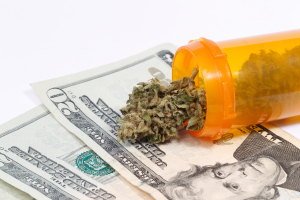Medical marijuana: Better than current treatments

By Daniel Takash
Florida voters will decide whether to remove criminal penalties on medical marijuana dispensaries and the patients that use them for treating state-approved medical conditions.
There has never been a referendum like Amendment 2 required to legalize the use of prescription Vicodin, OxyContin, oxymorphone, or similar painkillers, despite the fact that over 40 people per day die from prescription overdoses of these drugs in the United States. For this reason, it is illogical to oppose the use of marijuana, a less dangerous drug, for the same purpose.
Opponents of medical marijuana need to show why a drug that has produced no deaths in other states with legalized medical marijuana should be denied to sick people who could, under the recommendation of a doctor, receive the help they need battling serious ailments.
MEDICAL BENEFITS: Marijuana has been known to reduce chronic pain in HIV and cancer patients and can slow the progression of Alzheimer’s.
Marijuana has tremendous medical potential, particularly as a substitute for some dangerous prescription drugs. It reduces chronic pain in HIV and cancer patients, can help slow the progression of Alzheimer’s and alleviates the suffering caused by diseases like multiple sclerosis and other serious diseases.
Numerous studies demonstrate these positive effects, and for this reason the American College of Physicians supported the use of medical marijuana in 2008.
Medical marijuana is quite frequently cheaper than more commonly used prescriptions. This will not only decrease the burden prescription drug payments place on entitlement spending, but, more importantly, will save money for those using the drugs for treatment and have most likely been put out of work by their ailments. In 2010, the average American paid $1,432 on prescription drugs.
The concern over children gaining increased access to marijuana due to legalization for medical use, though well-intentioned, is not backed in any way by reality. Recent findings by the Cato Institute show there is no link between legalization of medical marijuana and increased use by children.
More importantly, we already know that minors abuse prescription drugs by raiding their family medicine cabinet. This is a dangerous practice, but there are two things that we can learn from it.
First, nobody is calling for a ban on OxyContin or other prescription painkillers. This is because most realize there are other, less restrictive means to limit this, and even if there were no way to stop it, these medicines produce a societal benefit that outweighs the abuse.
Second, if we know teenagers abuse prescription drugs, then harm minimization should be the goal of drug policy. This can only be accomplished if the drugs in the medicine cabinet are less dangerous when used. In the same way it’s better for teens to be drinking beer from the fridge than whiskey from the liquor cabinet, it would be better for them to take a drug with minimal side effects than one with potentially fatal ones.
Marijuana fits this bill. It is not addictive, making rehabilitation treatment easier due to a lack of physical dependency. Additionally, medical marijuana use had led to no deaths due to overdose, compared with 2,666 killed by prescription drug overdose in Florida alone in the year 2012.
All of the arguments against medical marijuana legalization that aren’t directly related to its efficacy as medicine are simply red herrings.
None of the arguments articulated by opponents are able to outweigh the benefits of cheap, effective pain relief and treatment already prescribed by doctors to nearly 2.4 million people in the United States.
This is no snake oil, and even if one is skeptical of the medical benefits to be gained, it still would be preferable for more people to use medical marijuana to reduce the number of overdoses that come from prescription drug abuse every year.
There are many dangerous drugs we allow for medical use because they help people who are sick. Why not allow one more that is (at least) as effective, less dangerous, and less addictive?
Daniel Takash in a Young Voices Advocate studying applied mathematics at Johns Hopkins University.







